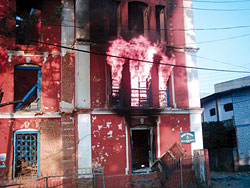|
|
| IN FLAMMATORY: The hisotric Tansen Darbar burns on the morning of 1 February after a Maoist attack , just as King Gyanendra was delivering his proclamation in which he said terrorism had been reduced to 'isolated criminal acts'. |
How else does one explain the flurry of face-to-face interviews with the comrade leaders in the Indian and Nepali media? Suddenly after being elusive for ten years and seeing him only in a rough drawing we have Prachanda's stubbled visage staring at us from the newspapers. We can now put a face to the revolutionary path that bears his name. Together with Baburam Bhattarai, he has tailored his message for specific target audiences: for Indian policy-makers through The Hindu, the Nepali urban middle class through Kantipur and perhaps to Kathmandu-based reps of the international community through this paper.
Shorn of customary revolutionary jargon, the message has been unusually conciliatory: we are reasonable people, we are tired of the bloodshed too, we don't want any position in a future government, the parties should take the initiative and we'll support them, we are willing to even accept an autocratic monarchy if that's what the people want.
As a public relations offensive, it has worked brilliantly. Few who have read the interviews have failed to be impressed, which can only mean that it makes the king and his army look uncompromising and rigid. Just as the four-month unilateral ceasefire made the RNA look like warmongers even though the Maoists continued with their extortion and war preparation, this time too their superior psywar tactics have made many forget that they have been shooting mayoral candidates in contravention of their assurances to the UN.
It is not difficult to see where the Maoists are headed next. They are preparing for a tenth anniversary big bang and keeping up the pressure on the capital till their D-Day on 6 April. All this can only mean one thing: more bloodshed, more district capitals reduced to ashes like Tansen and Dhankuta and mounting desperation and misery for the Nepali people in the next two months.
The solution lies in the hands of one man: King Gyanendra. By vesting on himself all power the monarch can resolve this deadly stalemate if he wants. What could be better than to seize the opportunity of Democracy Day on 19 February to defuse the crisis by beginning the process of restoring power to the people and together negotiate the safe landing that the Maoists now seem to want.
Time is running out and this long war has gone on for long enough.



